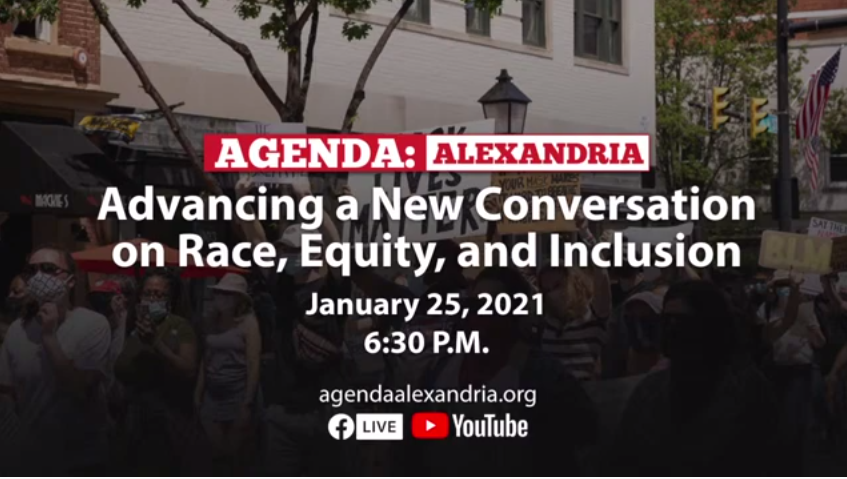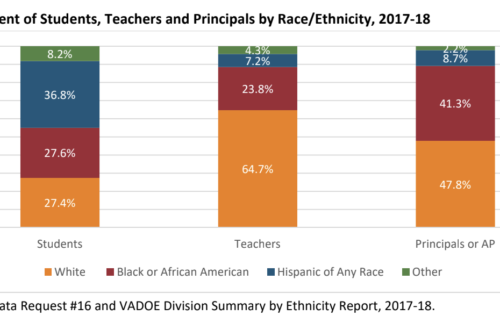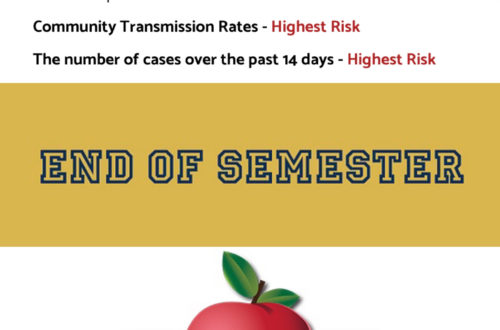Thoughtful and Impactful Discussion
Jackie Lutz

The events of the past year have brought conversations about race, equity, and inclusion to the forefront, a topic that was discussed during a recent Agenda: Alexandria panel.
Agenda Alexandria is a local non-profit and non-partisan organization that focuses on hosting panels and discussions that encourage civic dialogue and debate on a variety of topics. Due to the pandemic, Agenda Alexandria’s usual in-person format has shifted to an online setting, with free livestreams on YouTube.
During the January 25th panel, the moderator was Alyia Gaskins, who serves on the Agenda: Alexandria Board, is on a variety of other committees and councils, and is also currently in the race for City Council. The panelists included Bernadette Onyenaka, principal and co-founder of O&G Racial Equity Collaborative, Sara VanderGoot, therapist, registered yoga teacher, and co-owner of Mind the Mat Pilates & Yoga, and Jaqueline Tucker, the Race and Social Equity Officer for the City of Alexandria.
After an introduction of the speakers, the panel began with a discussion of why conversations like these are important and what needs to be different about them.
“I think what needs to be different is that we need to approach this from multiple levels,” said Tucker, “We need to talk about diversity, equity, and inclusion because it’s about so much more than the individual actor, but it’s about our systems and institutions that have this culture built into them.”
The conversation then shifted towards defining words that are important to the context of the discussion at hand, including race, racism, racist, privilege, and equity.
“Race is a social construct that is defined entirely by our phenotypical difference,” said Onyenaka when explaining the differences between race, racism, and racist. Onyenaka described racism as the “system of oppression based upon race” and a racist as a person “who buys into this ideology that people of color are inferior to white people, and then acts upon that belief.”
When asked about privilege, VanderGoot said, “My understanding of privilege is [that it is] an unearned access to resources and influence [on] the value of a society… that is given to you because you have white skin. What is often embedded in privilege is that it’s unseen by those who have it, and those who see it [often] don’t have it.”
The word equity was also touched upon, and Tucker said, “Equity simply means that everybody is getting what they need in order to belong and thrive and fully participate in our society. It’s a lot different from equality, which simply means that we want people to have access to something.”
The conversation continued to mention these words, and they were used when discussing a variety of other topics, including microaggressions, “color blindness,” diversity, and the politicization of race. The panelists also discussed how white people can feel discomfort hearing these words, particularly the word privilege because they know it means that a difficult conversation can be approaching. But, all of the panelists had a similar response to people fearful of the hard conversations about race: face it.
“The process for me has been evolutionary,” said VanderGoot, “I think that it’s very natural to feel off-put or offended when someone says ‘you have privilege.’ What I’ve come to recognize is that it’s important… to take full ownership and responsibility for our emotional reactions because they’re subjective… they don’t carry the truth, the truth is something that is [a] more objective, historical input from everybody who’s involved in society.”
Historical examples, on a local and national scale, also played a key role in the conversation. The three-fifths compromise of 1787 and the systems of oppression that were created during and following slavery were mentioned, as was Alexandria’s long history of lynchings, slavery, and segregation.
These historical events, on both levels, have shaped institutions and systems that oppress people of color, which is a form of racism known as structural racism.
“All structures and institutions have their own policies and their own procedures, their own ways of operating. They have a history that comes along with them as well,” said Tucker. She further explained that this dominant white culture is present in every system in society.
VanderGoot mentioned how businesses count as institutions, and how important it is for Alexandria business owners to go beyond statements of support and more inclusive advertising, and instead work and incorporate inclusiveness and anti-racism into their businesses practices.
“Being a white woman business owner, I recognize that not only my business has this influence on our community, but as a white person I have influence on this community,” she said, “so I need to look inside my institution to make sure that I have integrity there because that’s going to filter out into what kind of community I live in.”
Political actions being taken in Alexandria include the ALL Alexandria Committing Race and Social Equity Resolution, which was issued on January 23 by Alexandria City Council. It focuses on unequal outcomes seen in the city and what can be done about them, such as education attainment, poverty, home ownership, and groups of people most closely impacted by the pandemic. Tucker was a key organizer of the resolution, and was asked about it during the panel.
“Being very explicit about our history is one thing that the resolution sets out to do. The second thing is to acknowledge and celebrate our diversity, realizing that we have grown as a community… and have tried to create spaces where people are equal or have opportunity or access. But that is not enough.” said Tucker.
As the discussion was wrapping up, the panelists were asked what they wanted people to reflect on once the conversation was over.
“White people are not the problem, whiteness is… the ideology and benefit that comes with buying into whiteness. I would say, learn about whiteness, and really what that means, and the nuances thereof of whiteness,” Tucker said, “You have to be uncomfortable, you can’t grow without discomfort.”
Onyenaka mentioned HQ2 and Amazon coming to Alexandria that have a lot of people, herself included, nervous about housing stability. Her directive at the end of the conversation was to “Fight… as if it’s your child or your life on the line… get involved in the policy and advocating.”
VanderGoot directed her final statement towards white people: “Know that none of us are really going to know truly who we are and feel truly empowered until we take away white privilege and structural racism. At the root of this all there is a huge gift for all of us.”
The vastness and variety of the subjects discussed during this Agenda: Alexandria panel pertain to all aspects of life, which is why conversations that delve into the impacts they have on our local, national, and global society are so important.
“We can decide that it’s not a political issue, we can decide it’s a human issue because we’re all connected as a society, as a community… and if that requires conversations that make you uncomfortable, then so be it,” said Onyenaka, “We choose to make this a political issue, and we can choose to un-politicize it, and think about this in the grand scheme of things of us being human beings with a shared existence.”
ALL Alexandria homepage with resources, explanations, and tools: https://www.alexandriava.gov/Equity
Agenda: Alexandria website: https://agendaalexandria.com/





